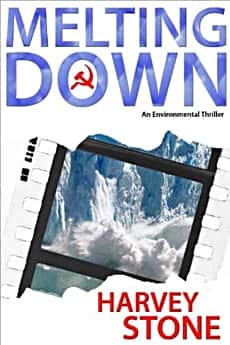Book review: Melting Down, by Harvey Stone
Unbelievably bad (July 12, 2013)

A friend sent this to me after making me promise to read it. Well, I did. However, this may be the worse published book I’ve ever read.
It’s difficult to know where to begin to dissect this utter waste of paper, ink, time, and money. Harvey Stone’s writing style is that of a dull normal 8th grader. I’ll admit there’s an outside possibility that Stone got his inspiration from the Bad Hemingway Contest, and decided to see if people would buy and read similar offal in book form, no matter how poorly he wrote it, but it is so effortlessly and relentlessly miserable that this is as far fetched as the plot.
If you’re a fan of good thriller authors such as Crais, Child, MacDonald, and others, you will detect not the faintest echo of their craft here. If the definition of a novel includes the author fleshing out scenes and making you feel involved in the characters and story, then this is no novel. Stone’s tone is clinical, not literary. There seems to be no aspect of novel writing that he hasn’t bludgeoned to death in this book, in terms of nearly-absent scene-setting, short-hand descriptions, moronically terse dialogue, etc. Worse, when he does attempt to describe something using a metaphor or simile, he blunders so badly you have to wonder if perhaps English is not his first language. Add to this a smattering of typographical and spelling errors, and what you’re left with is a book that, if it is not self-published, should have been.
Stone acknowledges that the characters and plot are fictional, but states that the facts are correct. Yet, he repeatedly mentions that the polar bear population is dwindling when in the real world it is doing no such thing. Thus, the reader is left with a book where nothing can be taken at face value. Unfortunately, this type of writing is common among ideologically-motivated authors, which may be one of Stone’s biggest stumbling blocks: He’s so certain that his distorted world view is faultless that he simply can’t be bothered either with the facts or with anything resembling a balanced approach.
Probably inadvertently, Stone’s main character (Tex Cassidy) himself is a victim of his flawed ideological certainty. Cassidy is portrayed as a former Ranger and ace reporter who sees connections (connects the dots
) where others see disassociated events. Yet, environmental-protector Cassidy lives a lifestyle that would destroy the planet faster than the Chicago Climate Exchange, if everyone else were to attempt to follow it. Furthermore, even though Cassidy’s wife died as a result of the unintended consequences of Cassidy’s own home improvement projects, Cassidy never once pauses to consider that his other observations and conclusions might also have unintended consequences that could spell the deaths of millions or billions. One thing Stone did nail was the current fashion of making the protagonist half two-fisted he-man, and half a quivering puddle of metrosexuality, a la Robert Parker’s Jesse Stone (no relation, as far as I know).
The bottom line is that this is a book with a message, and that message is For the love of all that’s holy, avoid any and all contact with this book.